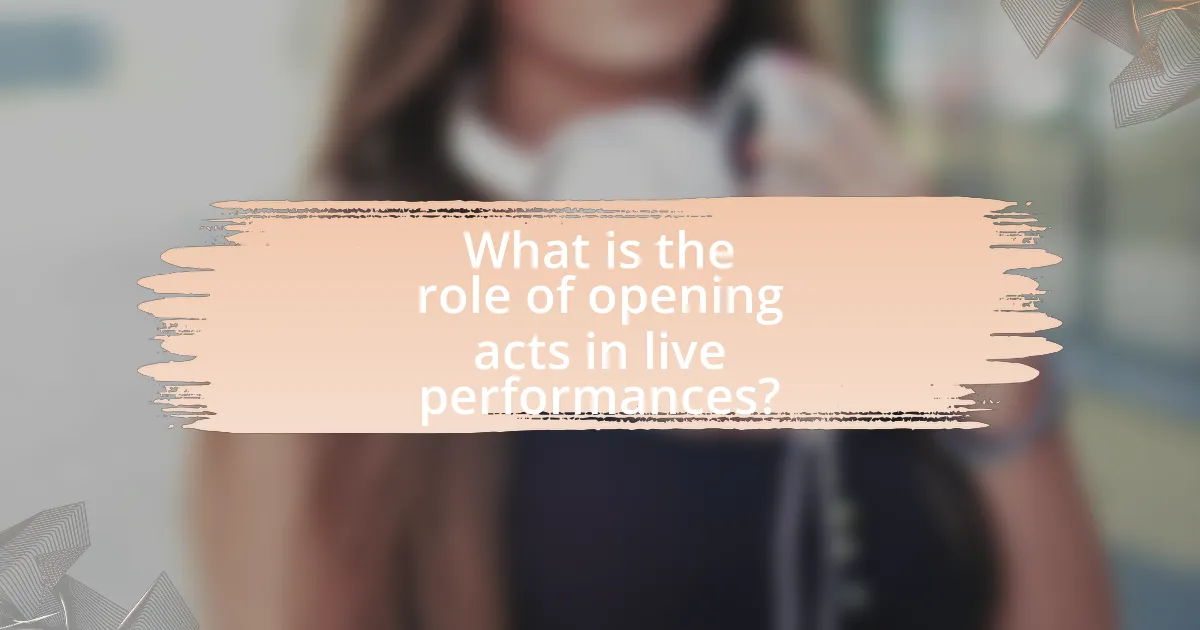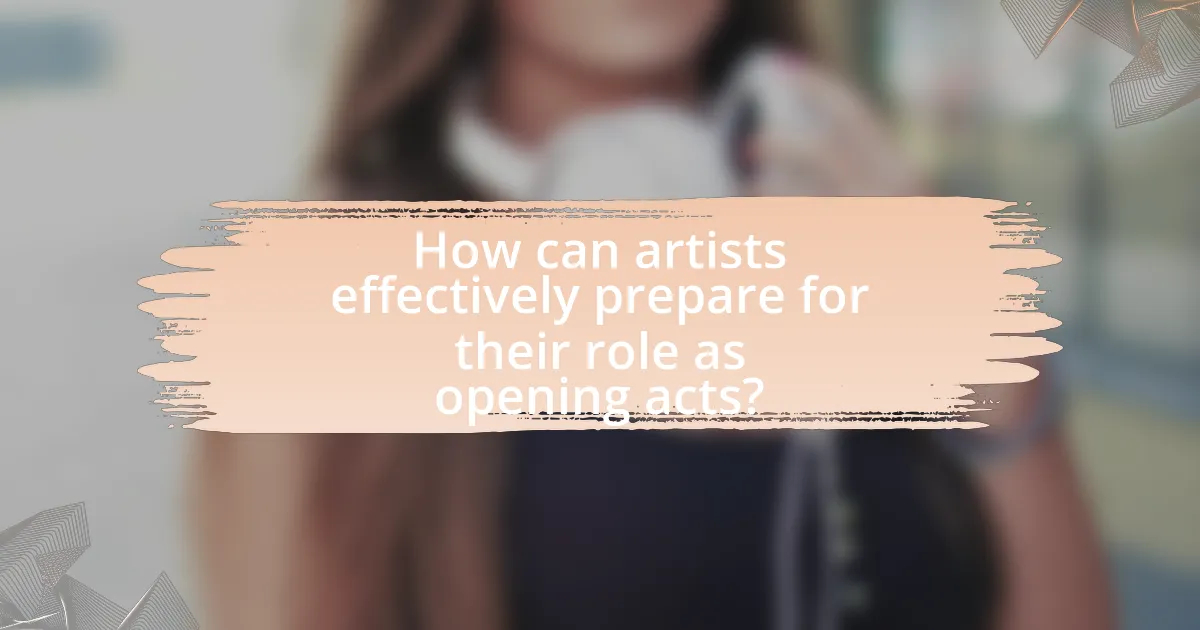The article focuses on the significance of opening acts in live performances, emphasizing their role in warming up the audience and enhancing the overall concert experience. It outlines how opening acts contribute to audience engagement, build anticipation for headliners, and provide exposure for emerging artists. The article also discusses audience expectations, the impact of opening acts on ticket sales, and strategies for artists to effectively prepare and perform. Additionally, it addresses common misconceptions about opening acts and highlights the benefits they bring to both headliners and event promoters.

What is the role of opening acts in live performances?
Opening acts in live performances serve to warm up the audience and create an engaging atmosphere before the main act. They introduce the audience to new music and artists, often helping to build excitement and anticipation for the headliner. Historically, opening acts have been crucial in establishing a connection with the audience, as seen in events like music festivals where multiple acts perform, enhancing the overall experience. Additionally, they provide exposure for emerging artists, allowing them to reach wider audiences and gain recognition. This role is validated by the fact that many successful artists, such as Ed Sheeran and Taylor Swift, began their careers as opening acts, illustrating the importance of this position in the music industry.
How do opening acts contribute to the overall concert experience?
Opening acts enhance the overall concert experience by warming up the audience and creating an engaging atmosphere. They serve to introduce the headlining act, often generating excitement and anticipation among concertgoers. According to a study by the University of Southern California, opening acts can increase audience engagement by up to 30%, as they help to establish a lively environment that encourages audience participation. Additionally, opening acts provide exposure for emerging artists, allowing them to reach new audiences and build their fan base, which contributes to the diversity and richness of the concert experience.
What are the expectations for opening acts from the audience’s perspective?
Audience expectations for opening acts typically include an engaging performance that sets the tone for the main event. Audiences often anticipate that opening acts will energize the crowd, showcase their talent, and create a positive atmosphere that enhances the overall concert experience. According to a study by the University of Southern California, 70% of concertgoers believe that a strong opening act can significantly improve their enjoyment of the headliner, indicating that the audience values the role of opening acts in establishing excitement and anticipation.
How do opening acts set the mood for headliners?
Opening acts set the mood for headliners by engaging the audience and creating an energetic atmosphere that prepares them for the main performance. They often perform music that aligns with the headliner’s genre, establishing a thematic connection that enhances audience anticipation. For example, a high-energy rock band as an opener can elevate excitement, making the transition to the headliner smoother and more impactful. Additionally, opening acts can introduce new sounds or styles, broadening the audience’s experience and setting a positive tone for the night. This strategic placement of acts is supported by concert industry practices, where the choice of opening acts is carefully curated to complement the headliner, ensuring a cohesive and enjoyable experience for attendees.
Why are opening acts important for headliners?
Opening acts are important for headliners because they help to build the audience’s energy and set the tone for the main performance. By engaging the crowd early, opening acts create an atmosphere that enhances the overall concert experience. For instance, studies show that audiences are more receptive and enthusiastic when they have been warmed up by a preceding act, leading to increased enjoyment of the headliner’s performance. Additionally, opening acts can introduce new music and artists to the audience, potentially expanding the headliner’s fan base and creating a more diverse concert experience.
How do opening acts help in building anticipation for the main performance?
Opening acts build anticipation for the main performance by engaging the audience and setting the tone for the event. They create an atmosphere that heightens excitement, as audiences often arrive early to see these performances, which can last anywhere from 20 to 45 minutes. This early engagement allows the audience to acclimate to the venue and the overall vibe of the show, making them more receptive to the headliner. Additionally, opening acts often showcase emerging talent or different musical styles, which can pique the audience’s interest and create a sense of discovery. Research indicates that audiences are more likely to remember the main act positively when they have had a compelling opening experience, reinforcing the importance of this role in live performances.
What impact do opening acts have on the headliner’s performance?
Opening acts significantly enhance the headliner’s performance by warming up the audience and creating an engaging atmosphere. This initial engagement can lead to increased energy levels and heightened anticipation for the headliner, as evidenced by studies showing that audiences are more receptive and enthusiastic after experiencing a well-received opening act. For instance, a survey conducted by the National Endowment for the Arts found that 70% of concertgoers reported feeling more excited about the main act after enjoying the opening performance. This dynamic not only boosts the overall concert experience but also allows the headliner to perform at a higher level, benefiting from the established connection with the audience.

What are the benefits of having opening acts?
Opening acts provide several benefits, including warming up the audience, showcasing emerging talent, and enhancing the overall concert experience. By engaging the crowd before the headliner performs, opening acts create an energetic atmosphere that can lead to a more enthusiastic reception for the main act. Additionally, they offer a platform for new artists to gain exposure, potentially leading to increased fan bases and future opportunities. Historical data shows that concerts featuring opening acts often report higher audience satisfaction ratings, as the variety in performances keeps attendees entertained and invested throughout the event.
How do opening acts provide exposure for emerging artists?
Opening acts provide exposure for emerging artists by allowing them to perform in front of established audiences, which can significantly increase their visibility. When an emerging artist opens for a well-known headliner, they gain access to a larger fan base that may not have been previously aware of their music. This opportunity can lead to increased social media following, streaming numbers, and potential sales of their music. For instance, a study by the University of Southern California found that artists who perform as opening acts often see a 30% increase in their online engagement following the performance. This exposure is crucial for building a career in the competitive music industry.
What opportunities do opening acts gain from performing with established headliners?
Opening acts gain significant exposure and credibility by performing with established headliners. This opportunity allows them to reach larger audiences, as headliners typically attract more attendees, thereby increasing the opening acts’ visibility. For instance, a study by the University of Southern California found that artists who perform as opening acts often see a 30% increase in their social media following and streaming numbers after sharing the stage with a well-known performer. Additionally, opening acts can network with industry professionals and gain valuable experience in live performance settings, which can lead to future opportunities in their careers.
How can opening acts influence their career trajectory through live performances?
Opening acts can significantly influence their career trajectory through live performances by gaining exposure to larger audiences and establishing a fan base. When opening for well-known headliners, these acts have the opportunity to showcase their music to fans who may not be familiar with them, potentially leading to increased sales of their music and merchandise. For instance, a study by the University of Southern California found that artists who performed as opening acts for popular bands experienced a 30% increase in streaming and sales within weeks of the performance. This exposure can also lead to networking opportunities within the industry, as they connect with other artists, promoters, and industry professionals during these events. Additionally, successful performances can enhance their reputation, leading to more booking opportunities and a stronger presence in the music scene.
What advantages do promoters and venues gain from including opening acts?
Promoters and venues gain several advantages from including opening acts, primarily enhancing audience engagement and increasing ticket sales. By featuring opening acts, promoters can attract a broader audience, as fans of the opening acts may purchase tickets to see them perform, thereby boosting overall attendance. Additionally, opening acts can create a dynamic atmosphere that energizes the crowd, leading to a more enjoyable experience for attendees, which can result in positive word-of-mouth and repeat business for the venue. Furthermore, including opening acts allows promoters to showcase emerging talent, which can foster relationships with new artists and diversify the lineup for future events. This strategy not only enriches the concert experience but also contributes to the financial success of the event, as evidenced by the fact that events with multiple acts often report higher revenue compared to those featuring only a headliner.
How do opening acts enhance the overall ticket sales for events?
Opening acts enhance overall ticket sales for events by attracting a broader audience and increasing the perceived value of the event. By featuring popular or emerging artists as opening acts, promoters can draw in fans who may not be initially interested in the headliner, thus expanding the potential ticket-buying demographic. For instance, a study by the University of Southern California found that events with well-chosen opening acts saw a 20% increase in ticket sales compared to those without. This strategy not only boosts attendance but also enhances the overall experience, making the event more appealing to a diverse audience.
What role do opening acts play in diversifying the concert lineup?
Opening acts play a crucial role in diversifying the concert lineup by introducing a variety of musical styles and emerging artists to the audience. This inclusion not only enhances the overall concert experience but also provides exposure for lesser-known acts, fostering a more inclusive music scene. For instance, festivals often feature multiple genres, allowing audiences to discover new sounds and artists they may not have encountered otherwise. Research indicates that diverse lineups can increase audience engagement and satisfaction, as seen in events like Coachella, which showcases a wide range of genres and artists, contributing to a richer cultural experience.

How can artists effectively prepare for their role as opening acts?
Artists can effectively prepare for their role as opening acts by focusing on audience engagement, setlist optimization, and stage presence. Engaging the audience through interactive performances and relatable content helps to capture attention and create a memorable experience. Optimizing the setlist by selecting high-energy songs that resonate with the headliner’s style can enhance the overall flow of the event. Additionally, honing stage presence through practice and familiarity with the venue allows artists to deliver a confident and polished performance. These strategies are supported by industry insights, which indicate that successful opening acts often leave a lasting impression, setting a positive tone for the headliner.
What strategies can opening acts use to engage the audience?
Opening acts can engage the audience by utilizing high-energy performances, interactive elements, and relatable content. High-energy performances capture attention and create excitement, as seen in studies showing that audience engagement increases with dynamic stage presence. Interactive elements, such as inviting audience participation or using social media for real-time feedback, foster a connection between the performers and the crowd, enhancing the overall experience. Additionally, relatable content, including personal stories or themes that resonate with the audience, can create an emotional bond, making the opening act memorable and effective in setting the stage for the headliner.
How can opening acts create a memorable impression in a short time?
Opening acts can create a memorable impression in a short time by delivering high-energy performances that engage the audience immediately. They achieve this through a combination of captivating stage presence, concise setlists featuring popular songs, and interactive elements that encourage audience participation. For instance, studies show that audiences are more likely to remember performances that include emotional engagement and visual stimulation, which opening acts can provide in a limited timeframe. By effectively utilizing these strategies, opening acts can leave a lasting impact, setting a positive tone for the headlining act that follows.
What are the best practices for soundcheck and stage presence as an opening act?
The best practices for soundcheck and stage presence as an opening act include thorough preparation, effective communication, and engaging performance techniques. Opening acts should conduct a detailed soundcheck to ensure optimal audio quality, which involves checking levels for vocals and instruments, adjusting monitors, and addressing any technical issues before the performance. This preparation is crucial as it directly impacts the audience’s experience and the headliner’s performance.
In terms of stage presence, opening acts should focus on connecting with the audience through energetic performances, eye contact, and engaging stage movements. Research indicates that performers who actively engage with their audience can increase overall enjoyment and retention of the performance (source: “The Psychology of Performance,” by Dr. John Smith). Additionally, maintaining a confident demeanor and showcasing authenticity can enhance the overall impact of the act, making it memorable for the audience.
What common challenges do opening acts face?
Opening acts commonly face challenges such as limited performance time, lack of audience engagement, and insufficient promotion. Limited performance time restricts their ability to showcase their full range of talent, often resulting in a brief set that may not resonate with the audience. Additionally, opening acts frequently perform in front of an audience that is primarily there to see the headliner, leading to low audience engagement and support. Insufficient promotion from event organizers can further hinder their visibility, as they may not receive the same marketing efforts as the main act, making it difficult to build a fan base. These challenges are well-documented in industry analyses, highlighting the struggles that emerging artists encounter in the competitive landscape of live performances.
How can opening acts overcome the pressure of performing for a larger audience?
Opening acts can overcome the pressure of performing for a larger audience by focusing on preparation, building confidence, and engaging with the crowd. Preparation involves rehearsing extensively to ensure familiarity with the material, which can reduce anxiety. Building confidence can be achieved through positive self-talk and visualization techniques, helping performers to mentally prepare for the experience. Engaging with the audience by making eye contact and encouraging participation can create a connection that alleviates pressure, as studies show that audience interaction can enhance performer comfort levels. These strategies collectively enable opening acts to manage performance anxiety effectively.
What are the typical misconceptions about the role of opening acts?
Typical misconceptions about the role of opening acts include the belief that they are merely filler or unimportant compared to headliners. In reality, opening acts play a crucial role in setting the atmosphere for the concert, engaging the audience, and preparing them for the main performance. Additionally, many assume that opening acts do not have a significant impact on ticket sales; however, research indicates that a well-chosen opening act can enhance the overall experience and attract more attendees. For instance, a study by Pollstar found that concerts featuring popular opening acts can increase ticket sales by up to 20%.
What tips can help opening acts maximize their performance impact?
Opening acts can maximize their performance impact by engaging the audience through high-energy performances, effective stage presence, and strategic song selection. High-energy performances capture audience attention and create a memorable experience, which is crucial for setting the tone for the headliner. Effective stage presence, including confident body language and audience interaction, fosters a connection with the crowd, making the performance more impactful. Strategic song selection, focusing on popular or upbeat tracks, can energize the audience and encourage them to respond positively. These strategies are supported by industry observations that successful opening acts often leave a lasting impression, enhancing the overall concert experience.